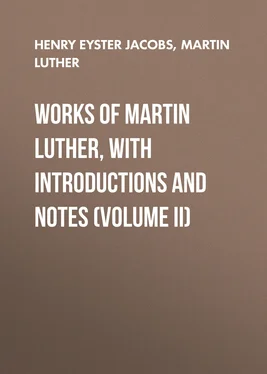Henry Eyster Jacobs - Works of Martin Luther, with Introductions and Notes (Volume II)
Здесь есть возможность читать онлайн «Henry Eyster Jacobs - Works of Martin Luther, with Introductions and Notes (Volume II)» — ознакомительный отрывок электронной книги совершенно бесплатно, а после прочтения отрывка купить полную версию. В некоторых случаях можно слушать аудио, скачать через торрент в формате fb2 и присутствует краткое содержание. Жанр: foreign_prose, foreign_religion, Философия, foreign_psychology, foreign_antique, на немецком языке. Описание произведения, (предисловие) а так же отзывы посетителей доступны на портале библиотеки ЛибКат.
- Название:Works of Martin Luther, with Introductions and Notes (Volume II)
- Автор:
- Жанр:
- Год:неизвестен
- ISBN:нет данных
- Рейтинг книги:3 / 5. Голосов: 1
-
Избранное:Добавить в избранное
- Отзывы:
-
Ваша оценка:
- 60
- 1
- 2
- 3
- 4
- 5
Works of Martin Luther, with Introductions and Notes (Volume II): краткое содержание, описание и аннотация
Предлагаем к чтению аннотацию, описание, краткое содержание или предисловие (зависит от того, что написал сам автор книги «Works of Martin Luther, with Introductions and Notes (Volume II)»). Если вы не нашли необходимую информацию о книге — напишите в комментариях, мы постараемся отыскать её.
Works of Martin Luther, with Introductions and Notes (Volume II) — читать онлайн ознакомительный отрывок
Ниже представлен текст книги, разбитый по страницам. Система сохранения места последней прочитанной страницы, позволяет с удобством читать онлайн бесплатно книгу «Works of Martin Luther, with Introductions and Notes (Volume II)», без необходимости каждый раз заново искать на чём Вы остановились. Поставьте закладку, и сможете в любой момент перейти на страницу, на которой закончили чтение.
Интервал:
Закладка:
Now, although I am too small a man to make propositions which might effect a reform in this dreadful state of things, nevertheless I may as well sing my fool's song to the end, and say, so far as I am able, what could and should be done by the temporal authorities or by a general council.
[Sidenote: Abolition of Annates]
1 . Every prince, nobleman and city should boldly forbid their subjects to pay the annates to Rome and should abolish them entirely 198 198 See above, p. 84, note 1.
; for the pope has broken the compact, and made the annates a robbery, to the injury and shame of the whole German nation. He gives them to his friends, sells them for large amounts of money, and uses them to endow offices. He has thus lost his right to them, and deserves punishment. It is therefore the duty of the temporal authorities to protect the innocent and prevent injustice, as Paul teaches in Romans xiii [Rom. 13:4], and St. Peter in I Peter ii [1 Pet. 2:14], Rom. and even the canon law in Case 16, Question 7, de filiis 199 199 The passage is chapter 31, Filiis vel nepotibus . It provides that in case the income of endowments bequeathed to the Church is misused, and appeals to the bishop and archbishop fail to correct the misuse, the heirs of the testator may appeal to the royal courts. Luther wishes this principle applied to the annates.
. Thus it has come about that men are saying to the pope and his followers, Tu ora , "Thou shalt pray"; to the emperor and his followers, Tu protege , "Thou shalt guard"; to the common man, Tu labora , "Thou shalt work." Not, however, as though everyone were not to pray, guard and work; for the man who is diligent in his calling is praying, guarding and working in all that he does, but everyone should have his own especial task.
[Sidenote: Prohibition of Roman Appointments]
2 . Since the pope with his Roman practices—his commends 200 200 See above, pp. 91 f.
, adjutories 201 201 See above, p. 91.
, reservations 202 202 See above, p. 94.
, gratiae expectativae 203 203 i. e.. Promises to bestow on certain persons livings not yet vacant. Complaint of the evils arising out of the practice was continually heard from the year 1416. For the complaints made at Worms (1521), see Wrede, op. cit. , II, 710.
, papal months 204 204 See above, pp. 86 f.
, incorporations 205 205 See above, pp. 92 f.
, unions 206 206 See above, p. 93.
, pallia 207 207 See above, p. 89.
, rules in chancery 208 208 Rules for the transaction of papal business, including such matters as appointments and the like. At Worms (1521) the Estates complain that these rules are made to the advantage of the "courtesans" and the disadvantage of the Germans. (Wrede, op. cit. , II, pp. 675 f.)
, and such like knavery—usurps all the German foundations without authority and right, and gives and sells them to foreigners at Rome, who do nothing in German lands to earn them; and since he thereby robs the ordinaries 209 209 The local Church authorities, here equivalent to "the bishops." On use of term see Realencyk. , XIV, 424.
of their rights, makes the bishops mere ciphers and figure-heads, and acts against his own canon law, against nature and against reason, until it has finally gone so far that out of sheer avarice the livings and benefices are sold to gross, ignorant asses and knaves at Rome, while pious and learned folk have no profit of their wisdom and merit, so that the poor people of the German nation have to go without good and learned prelates and thus go to ruin:
Therefore, the Christian nobility should set itself against the pope as against a common enemy and destroyer of Christendom, and should do this for the salvation of the poor souls who must go to ruin through his tyranny. They should ordain, order, and decree, that henceforth no benefice shall be drawn into the hands of Rome, and that hereafter no appointment shall be obtained there in any manner whatsoever, but that the benefices shall be brought out and kept out from under this tyrannical authority; and they should restore to the ordinaries the right and office of ordering these benefices in the German nation as best they may. And if a "courtesan" were to come from Rome, he should receive a strict command either to keep his distance, or else to jump into the Rhine or the nearest river, and take the Roman ban, with its seals and letters, to a cold bath. They would then take note at Rome that the Germans are not always mad and drunken, but that they have really become Christians, and intend to permit no longer the mockery and scorn of the holy name of Christ, under which all this knavery and destruction of souls goes on, but have more regard to God and His glory than to the authority of men.
[Sidenote: Restoration of Local Church Rights]
3. An imperial law should be issued, that no bishop's cloak 210 210 The sign of the episcopal office; as regards archbishops, the pallium ; see above, p. 8q, and note.
and no confirmation of any dignity 211 211 See above, p. 87, note 1.
whatsoever shall henceforth be secured from Rome, but that the Church ordinance of the most holy and most famous Council of Nicaea 212 212 The first of the ecumenical councils (A. D. 325). The decree to which Luther here refers is canon IV of that Council. Cf. Köhler, L. und die Kg. , pp. 139 ff.
shall be restored, in which it is decreed that a bishop shall be confirmed by the two nearest bishops or by the archbishop. If the pope will break the statutes of this and of all other councils, what is the use of holding councils; or who has given him the authority thus to despise and break the rules of councils?
If he has this power then we should depose all bishops, archbishops and primates 213 213 The primate is the ranking archbishop of a country.
and make them mere parish-priests, so that the pope alone may be over them, as he now is. He leaves to bishops, archbishops and primates no regular authority or office, usurps everything for himself, and lets them keep only the name and empty title. It has gone so far that by his "exemptions" 214 214 "Exemption" was the practice by which monastic houses were withdrawn from the jurisdiction of the bishops and made directly subject to the pope. The practice seems to have originated in the X Century with the famous monastery of Cluny (918), but it was almost universal in the case of the houses of the mendicant orders. The bishops made it a constant subject of complaint, and the Lateran Council (Dec. 19, 1516) passed a decree abolishing all monastic exemptions, though the decree does not seem to have been effective. See Creighton , History of the Papacy, V, 266.
the monasteries, the abbots and the prelates are withdrawn from the regular authority of the bishops, so that there is no longer any order in Christendom. From this must follow what has followed—relaxation of discipline and license to do evil everywhere—so that I verily fear the pope can be called the "man of sin." [2 Thess. 2:3] There is in Christendom no discipline, no rule, no order; and who is to blame except the pope? This usurped authority of his he applies strictly to all the prelates, and takes away their rods; and he is generous to all subjects, giving them or selling them their liberty.
Nevertheless, for fear he may complain that he is robbed of his authority, it should be decreed that when the primates or archbishops are unable to settle a case, or when a controversy arises among themselves, such a case must be laid before the pope, but not every little matter 215 215 The papal interference in the conduct of the local Church courts was as flagrant as in the appointments, of which Luther has heretofore spoken. At Worms (1521) it was complained that cases were cited to Rome as a court of first instance, and the demand was made that a regular course of appeals should be re-established. Wrede, op. cit. , II, 672, 718.
. Thus it was done in olden times, and thus the famous Council of Nicaea decreed 216 216 The reference is Canon V of the Council of Sardica (A. D. 343), incorporated in the canon law as a canon of Nicaea ( Pt. II, qu. 6, c. 5 ). See Köhler, L. und die Kg. , 151.
. If a case can be settled without the pope, then his Holiness should not be troubled with such minor matters, but give himself to that prayer, meditation and care for all Christendom, of which he boasts. This is what the Apostles did. They said, "It is not meet that we should leave the Word of God and serve tables, but we will keep to preaching and prayer and set others over the work." [Acts 6:2] But now Rome stands or nothing else than the despising of the Gospel and of prayer, and for the serving of "tables," i. e., of temporal affairs, and the rule of the Apostles and of the pope agree as Christ agrees with Lucifer, heaven with hell, night with day; yet he is called "Vicar of Christ and Successor of the Apostles."
Интервал:
Закладка:
Похожие книги на «Works of Martin Luther, with Introductions and Notes (Volume II)»
Представляем Вашему вниманию похожие книги на «Works of Martin Luther, with Introductions and Notes (Volume II)» списком для выбора. Мы отобрали схожую по названию и смыслу литературу в надежде предоставить читателям больше вариантов отыскать новые, интересные, ещё непрочитанные произведения.
Обсуждение, отзывы о книге «Works of Martin Luther, with Introductions and Notes (Volume II)» и просто собственные мнения читателей. Оставьте ваши комментарии, напишите, что Вы думаете о произведении, его смысле или главных героях. Укажите что конкретно понравилось, а что нет, и почему Вы так считаете.












